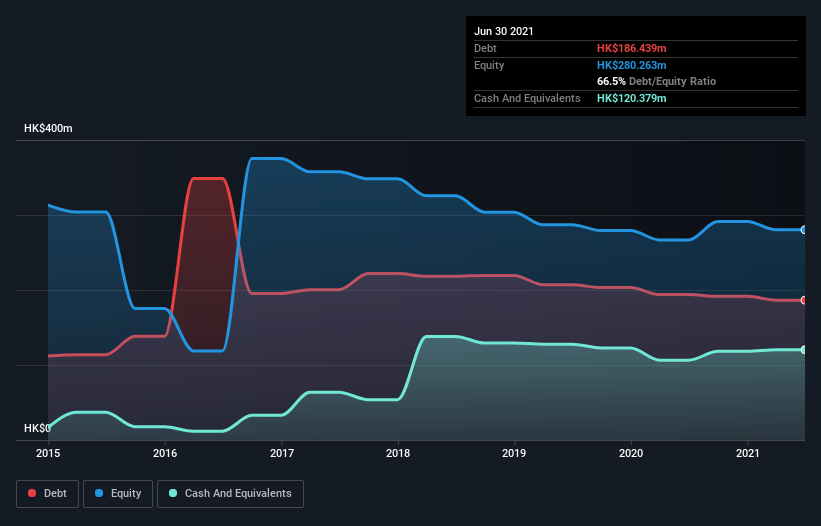
Warren Buffett famously said, 'Volatility is far from synonymous with risk.' So it might be obvious that you need to consider debt, when you think about how risky any given stock is, because too much debt can sink a company. As with many other companies Sino Golf Holdings Limited (HKG:361) makes use of debt. But the more important question is: how much risk is that debt creating?
Why Does Debt Bring Risk?
Debt assists a business until the business has trouble paying it off, either with new capital or with free cash flow. In the worst case scenario, a company can go bankrupt if it cannot pay its creditors. While that is not too common, we often do see indebted companies permanently diluting shareholders because lenders force them to raise capital at a distressed price. Having said that, the most common situation is where a company manages its debt reasonably well - and to its own advantage. The first thing to do when considering how much debt a business uses is to look at its cash and debt together.
View our latest analysis for Sino Golf Holdings
What Is Sino Golf Holdings's Net Debt?
The chart below, which you can click on for greater detail, shows that Sino Golf Holdings had HK$186.4m in debt in June 2021; about the same as the year before. However, because it has a cash reserve of HK$120.4m, its net debt is less, at about HK$66.1m.

A Look At Sino Golf Holdings' Liabilities
Zooming in on the latest balance sheet data, we can see that Sino Golf Holdings had liabilities of HK$214.1m due within 12 months and liabilities of HK$47.5m due beyond that. On the other hand, it had cash of HK$120.4m and HK$71.3m worth of receivables due within a year. So it has liabilities totalling HK$69.9m more than its cash and near-term receivables, combined.
Given Sino Golf Holdings has a market capitalization of HK$1.09b, it's hard to believe these liabilities pose much threat. But there are sufficient liabilities that we would certainly recommend shareholders continue to monitor the balance sheet, going forward. When analysing debt levels, the balance sheet is the obvious place to start. But it is Sino Golf Holdings's earnings that will influence how the balance sheet holds up in the future. So when considering debt, it's definitely worth looking at the earnings trend. Click here for an interactive snapshot.
In the last year Sino Golf Holdings wasn't profitable at an EBIT level, but managed to grow its revenue by 27%, to HK$318m. With any luck the company will be able to grow its way to profitability.
Caveat Emptor
While we can certainly appreciate Sino Golf Holdings's revenue growth, its earnings before interest and tax (EBIT) loss is not ideal. Indeed, it lost HK$6.8m at the EBIT level. When we look at that and recall the liabilities on its balance sheet, relative to cash, it seems unwise to us for the company to have any debt. So we think its balance sheet is a little strained, though not beyond repair. We would feel better if it turned its trailing twelve month loss of HK$18m into a profit. So to be blunt we do think it is risky. The balance sheet is clearly the area to focus on when you are analysing debt. But ultimately, every company can contain risks that exist outside of the balance sheet. We've identified 1 warning sign with Sino Golf Holdings , and understanding them should be part of your investment process.
At the end of the day, it's often better to focus on companies that are free from net debt. You can access our special list of such companies (all with a track record of profit growth). It's free.
If you're looking to trade Sino Golf Holdings, open an account with the lowest-cost platform trusted by professionals, Interactive Brokers.
With clients in over 200 countries and territories, and access to 160 markets, IBKR lets you trade stocks, options, futures, forex, bonds and funds from a single integrated account.
Enjoy no hidden fees, no account minimums, and FX conversion rates as low as 0.03%, far better than what most brokers offer.
Sponsored ContentNew: Manage All Your Stock Portfolios in One Place
We've created the ultimate portfolio companion for stock investors, and it's free.
• Connect an unlimited number of Portfolios and see your total in one currency
• Be alerted to new Warning Signs or Risks via email or mobile
• Track the Fair Value of your stocks
This article by Simply Wall St is general in nature. We provide commentary based on historical data and analyst forecasts only using an unbiased methodology and our articles are not intended to be financial advice. It does not constitute a recommendation to buy or sell any stock, and does not take account of your objectives, or your financial situation. We aim to bring you long-term focused analysis driven by fundamental data. Note that our analysis may not factor in the latest price-sensitive company announcements or qualitative material. Simply Wall St has no position in any stocks mentioned.
Have feedback on this article? Concerned about the content? Get in touch with us directly. Alternatively, email editorial-team (at) simplywallst.com.
About SEHK:361
Sino Golf Holdings
An investment holding company, engages in the manufacture and trading of golf equipment, and related components and parts in Japan, North America, Europe, rest of Asia, and internationally.
Flawless balance sheet very low.
Similar Companies
Market Insights
Community Narratives



